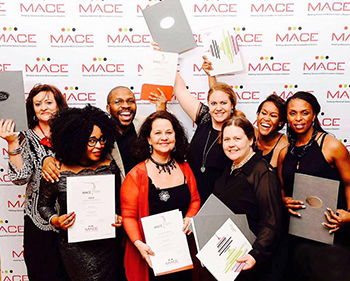
From the left: Martie Nortjé, Lerato Sebe, Thabo Kessah,
Lacea Loader, Lelanie de Wet, Leonie Bolleurs,
Leslé-Ann George, and Mamosa Makaya from the
UFS Communication and Brand Management team
at the MACE Excellence Awards, where they received
two Merit Awards, two Excellence Awards, four Gold Awards,
one Platinum Award, and one Severus Cerff: Special Award.
The Department of Communication and Brand Management at the University of the Free State (UFS) won ten awards during the Excellence Awards of the national association of Marketing, Advancement, and Communication in Education (MACE), held on 24 November 2016 in Cape Town. Hundred and sixty two awards were presented at the event.
At the awards ceremony, the department further received the Severus Cerff Award for demonstrating consistent and outstanding excellence in the 2016 Excellence Awards Programme.
The awards ceremony is part of the MACE Annual National Congress, which took place from 23 to 25 November 2016. The MACE Congress is a platform where experts from the fields of marketing, advancement, and communication share experiences and best practices. This year’s programme included speakers such as Dr Imtiaaz Sooliman, Founder of Gift of the Givers, Ruda Landman, Non-Executive Director of Media24 Limited, and Jonathan Shapiro, well-known cartoonist.
Lacea Loader, Director of the Department of Communication and Brand Management, said, “I am extremely proud of our achievements and I’m privileged to work with such a high-performing team. The fact that we received the Severus Cerff Award for consistent excellence is an additional, exceptional accomplishment.”
Other awards include a Platinum Award, four Gold Awards, two Excellence Awards, and two Merit Awards. Martie Nortjé, Assistant Director: Branding and Merchandise, received a Platinum Award for KovsieGear, the university’s merchandise shop. The Platinum Award is given to all the entries receiving a Gold Award of Excellence in a category, and the best entry in a division receives the award.
Leonie Bolleurs, Assistant Director: Internal Communication, received the Gold Awards for the Sound [W]right UFS student tone and voice guide, the Spaces and Places Video, the Student Bursary Fund Campaign: Photographs as well as the Excellence Awards for the Student Bursary Fund Campaign: Video and the Expanded Footprints Publication. Loader was awarded with the Gold Award for the Facilitation of the review of the UFS Language Policy. This award is given to the highest-scoring entry in every category.
Thabo Kessah, Senior Officer: Internal Communication at the Qwaqwa Campus, and Loader each received a Merit Award for the Ke Eo Taba Qwaqwa Newsletter and Prof Jonathan Jansen’s Commemorative Book: For such a time as this.
Earlier this year, KovsieGear received Gold at the 2016 Prism Awards of the Public Relations Institute of Southern Africa (PRISA). The B Safe Take Action campaign also recently received an award at the African Excellence Awards in Cape Town.